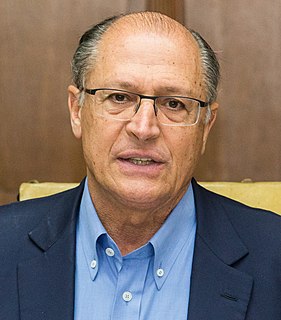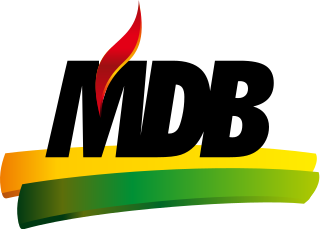
The Brazilian military government was the authoritarian military dictatorship that ruled Brazil from April 1, 1964 to March 15, 1985. It began with the 1964 coup d'état led by the Armed Forces against the administration of President João Goulart—who, having been vice-president, had assumed the office of president upon the resignation of the democratically elected president Jânio Quadros—and ended when José Sarney took office on March 15, 1985 as President. The military revolt was fomented by Magalhães Pinto, Adhemar de Barros, and Carlos Lacerda, Governors of Minas Gerais, São Paulo, and Guanabara. The coup was also supported by the Embassy and State Department of the United States.

Augusto Hamann Rademaker Grünewald was an admiral, of German and Danish descent, in the Brazilian navy. Rademaker was one of the leaders of the Military Junta that ruled Brazil between the illness of Artur da Costa e Silva in August 1969 and the investiture ceremony of Emílio Garrastazu Médici in October of that same year, elected by fellow officer generals and confirmed by the Congress. In the same occasions Rademaker was picked and "elected" as vice-president for the same term as Medici's (1969–1974).

José Serra is a Brazilian politician who has served as a Congressman, Senator, Minister of Planning, Minister of Health, Mayor of São Paulo, Governor of São Paulo state, and Minister of Foreign Affairs of Brazil.
Folha de S.Paulo, also known as Folha de São Paulo, or simply Folha, is a Brazilian daily newspaper founded in 1921 under the name Folha da Noite and published in São Paulo by the Folha da Manhã company.

Geraldo José Rodrigues de Alckmin Filho is a Brazilian politician who served as the Governor of São Paulo from 2001 to 2006, and then again from 2011 to 2018. He was the Brazilian Social Democracy Party (PSDB) presidential nominee for the 2018 presidential election. He is usually described by political analysts and supporters as a pro-business centrist, closely associated with the political and financial establishment.

A Military Junta or Junta Militar ruled Brazil from August 31 to October 30, 1969, between the sudden illness of President Artur da Costa e Silva and the swearing-in of Emílio Garrastazu Médici as his successor.

The Ato Institucional Número Cinco – AI-5 was the fifth of seventeen major decrees issued by the military dictatorship in the years following the 1964 coup d'état in Brazil. Institutional Acts were the highest form of legislation during the military regime, given that they overruled even the highly authoritarian Constitution, and were enforced without the possibility of judicial review. They were issued on behalf of the "Supreme Command of the Revolution".

Presidential elections were held in Brazil on 15 January 1985, the last to be held indirectly through an electoral college, and the last to be held under the military regime. The electoral college system was put in place so that the military elite that controlled the government could secure the election of the candidate chosen by the High Command of the Armed Forces as President. However, in 1985, due to the process of negotiated transition to democracy that started in the late 1970s, the politicians in the electoral college were placed under no coercion, and were allowed to choose the president of their choice.

Michel Miguel Elias Temer Lulia is a Brazilian lawyer and politician who served as the 37th President of Brazil from 31 August 2016 to 31 December 2018. He took office after the impeachment and removal from office of his predecessor Dilma Rousseff. He had been Vice President since 2011 and Acting President since 12 May 2016, when Rousseff was suspended while she faced an impeachment trial. At the age of 75, he is the oldest person to have taken the office.

Alberto Goldman is a Brazilian engineer and politician. He was elected Vice Governor of São Paulo in 2006 with Governor José Serra. After Serra's resignation, Goldman became governor of São Paulo on 6 April 2010.

Fernando Haddad is a Brazilian academic and politician who served as Mayor of São Paulo from 2013 to 2017. He was the Workers' Party candidate for President of Brazil in the 2018 election, replacing former President Luiz Inácio Lula da Silva, whose candidacy was barred by the Superior Electoral Court under the Clean Slate law. Haddad faced Jair Bolsonaro in the run-off of the election, and lost the election with 44.87% of the votes against the 55.13% of Bolsonaro.

The National Renewal Alliance was a conservative political party that existed in Brazil between 1966 and 1979. It was the official party of the military that ruled Brazil from 1964 to 1985.

Ulysses Silveira Guimarães was a Brazilian politician and lawyer who played an important role in opposing the military dictatorship in Brazil and in the fight to restore democracy in the country. He died in a helicopter accident by the shore near Angra dos Reis, in the south of Rio de Janeiro state.

The Brazilian presidential election was held in 1978 through a electoral college system. The opposition's party, the Brazilian Democratic Movement (MDB), chose an anti-candidate to fill the spot and denounce the restrict democracy. The MDB chose General Euler Bentes Monteiro to run the elections against João Figueiredo from the National Renewal Alliance Party. João Figueiredo won with 355 electoral votes against 226 votes for Euler Monteiro.

The Brazilian presidential election was held in 1974, through a electoral college system with two parties. It was the 22nd Brazilian presidential election, and the 4th from the Brazilian military government.

Indirect presidential elections were held in Brazil on 3 October 1966 through an electoral college system. It was the second election during the Brazilian military government, with Artur da Costa e Silva as the sole candidate. Costa e Silva was elected with 295 votes from the ruling National Renewal Alliance Party (ARENA).

Events in the year 1969 in Brazil.

General elections were held in Brazil on 7 October 2018 to elect the President, Vice President and the National Congress. Elections for state governors and vice governors, state legislative assemblies and the Legislative Chamber of the Federal District were held at the same time.























